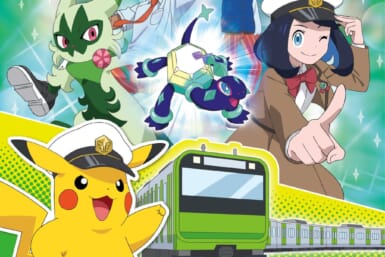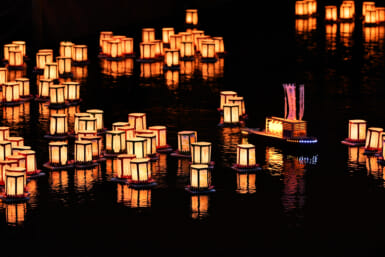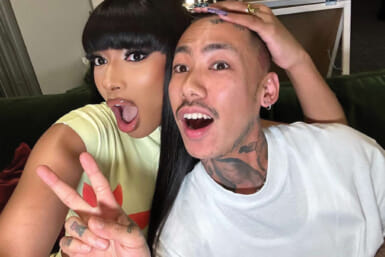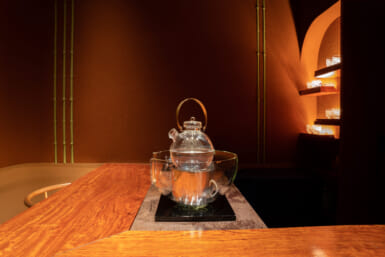In this month’s List of 7 article, we are looking at some of the most controversial moments on Japanese TV shows. While the country does have a reputation around the globe for making crazy television programs like Takeshi’s Castle, often the content here can be quite tame and without controversy. Finding scandalous moments that stood out, therefore, wasn’t easy. We decided to have a go anyway.
1. All Night Fuji: Colorful Language
A big hit with viewers despite airing at midnight on Saturdays, All Night Fuji regularly welcomed famous international musicians such as Madonna, Cyndi Lauper and Wham! It was also known for its obscene content, which included introducing pornographic videos and sex shops. After this became an issue in parliament in 1985, the program was forced to change its direction. A year earlier, one of the most famous incidents on the show occurred when female idol Akiko Matsumoto suddenly uttered the broadcast-prohibited term omanko — Japanese slang for female genitalia. The hosts threatened to reveal that her boyfriend was a bisexual celebrity if she didn’t say it. While they continued with their careers, Matsumoto lost about two years of work in the entertainment industry before making a comeback.
2. Kinniku Banzuke: Two Broken Vertebrae
Technically we’re cheating a little on this one as the episode in question was never televised. A TBS show in which contestants competed in a variety of sports-related challenges, Kinniku Banzuke (which means “muscle ranking,” though was known internationally as Unbeatable Banzuke) proved very popular with viewers during its run between October 14, 1995 and May 4, 2002. After two people were injured during filming on May 5, however, the program was put on hiatus and eventually canceled. In an episode titled “Chikarajima” (Power Island), Wei Tao and Takunori Isa both broke their vertebrae in challenges involving large boulders. Another TBS show titled Food Battle Club was canceled the same year after a junior high school student choked to death while imitating a “speed eating” game from the program.
3. Susunu! Denpa Shonen: Humiliating Nasubi
Between 1998 and 2002, Susunu! Denpa Shonen was the most extreme program on Japanese television. Participants took part in sadistic challenges such as hitchhiking from South Africa to Norway without any money. The most famous season, though, followed comedian Tomoaki Hamatsu, better known as Nasubi. His challenge was to win ¥1 million through magazine sweepstakes. Until achieving that, he had to stay alone and unclothed — an eggplant cartoon graphic covered his genitals — in a tiny apartment with hardly any amenities, forced to live off what he won via those sweepstakes. At first, he survived on just water. After winning some rice, he realized he had nothing to cook it on. He reached his target after 335 days but was then sent to South Korea to continue the challenge. The whole time, he thought it was being recorded when it was, in fact, being streamed to a live audience.
4. Yorosen!: Uncle Hitler
Yorosen! was a late-night daily Japanese edutainment program in which three all-female groups — Morning Musume, Berryz Kobo and Cute — took it in turns to have lighthearted classroom discussions on various topics, ranging from world leaders to cute pets. In an episode on December 4, 2008, the subject of the world’s greatest people was introduced by members of Cute, with singer Saki Nakajima leading the lesson. Strangely, they decided to include Adolf Hitler, who Nakajima casually referred to as “Uncle Hitler.” Glossing over his atrocities, she said he “captured the hearts of his citizens.” TV Tokyo apologized, stating that the program contained, “Improper contents based on insufficient knowledge of history.” Not long after the episode aired came the news that Yorosen! was to end.
5. Ashita, Mama ga Inai: Accusations of Prejudice
A dark drama series about 10 children living in an orphanage, Ashita, Mama ga Inai (Tomorrow Your Mother Won’t Be Here) premiered on Nippon Television (NTV) on January 15, 2014. While the first episode did pretty well in terms of ratings, there were immediate calls for the program to be canceled after it aired. Protesting groups, including foster care associations and orphanages, accused NTV of “violating human rights,” and displaying “prejudice against the children and staff who are working in these childcare institutions.” According to the then Welfare Minister Norihisa Tamura, “There were reports about a girl living in a children’s home having hurt herself [after watching the drama].” With Japanese advertisers pulling the plug on the series, NTV announced that it was making unspecified changes to the script.
6. Downtown no Gaki no Tsukai ya Arahende!!: Blackface
Hitoshi Matsumoto and Masatoshi Hamada are the most powerful comedy duo in Japan. Collectively known as Downtown, the shows they host tend to be extremely popular, particularly Downtown no Gaki no Tsukai ya Arahende!!, in which comedians humiliate and torture themselves and each other. While it’s usually amusing, harmless fun, on the New Year’s Eve special in 2017, the show made headlines globally for an offensive Beverly Hills Cop skit. Impersonating lead actor Eddie Murphy, Hamada painted his face black — a practice seen by many as deeply offensive. This certainly wasn’t the first time for a Japanese celebrity to use blackface when performing, though given Hamada’s standing in the entertainment world and the popularity of the program, it was arguably the most high-profile incident.
7. Terrace House: A Tragic Argument
In contrast to other reality shows like Big Brother, Terrace House was never known for its explosive arguments. Any issues participants had with each other were usually dealt with calmly during house meetings. The one major exception, though, occurred in the final season. Hana Kimura lost her temper with housemate Kai Kobayashi after he accidentally shrunk her cherished wrestling attire in the washing machine. The argument culminated with the pro wrestler knocking his hat off his head. She subsequently started receiving abusive messages online. Less than two months after the episode aired, Kimura tragically took her own life. Her mother, Kyoko Kimura, filed a lawsuit against Fuji TV and Terrace House production companies, claiming the show was produced in a way to make viewers dislike her daughter.









